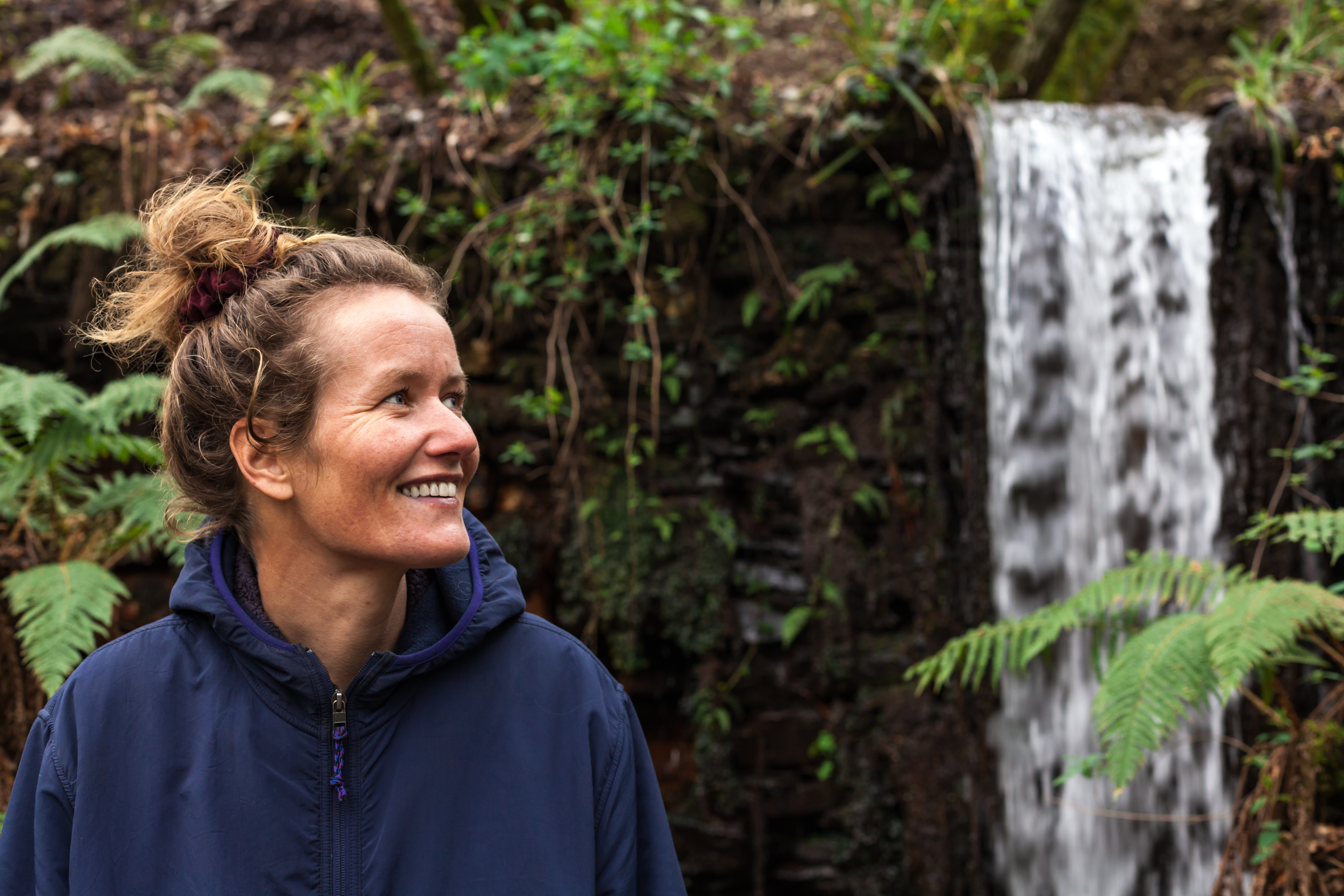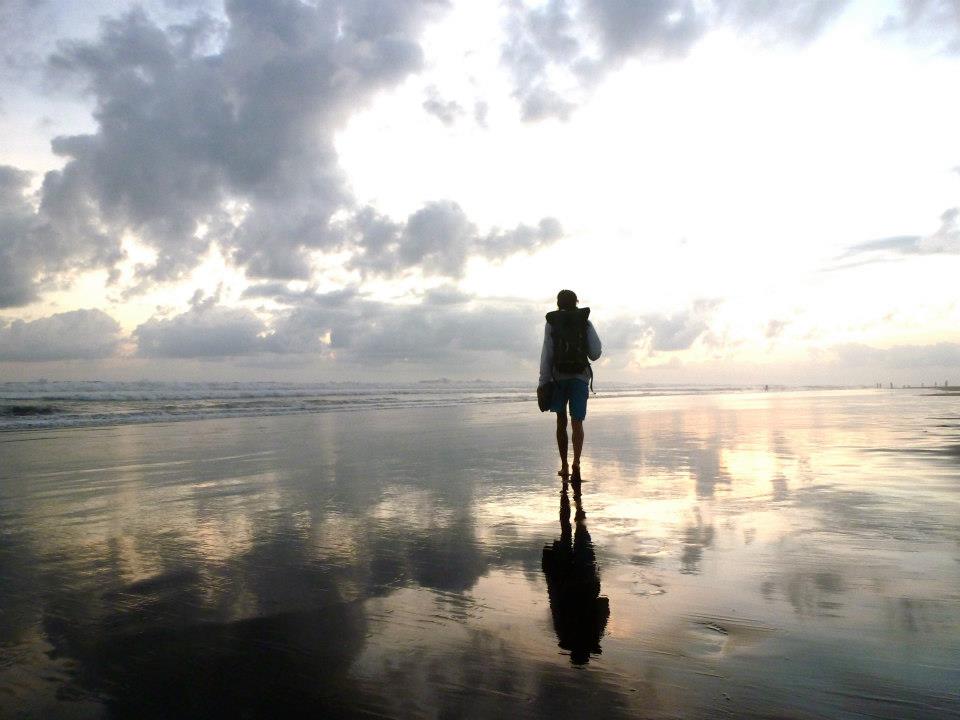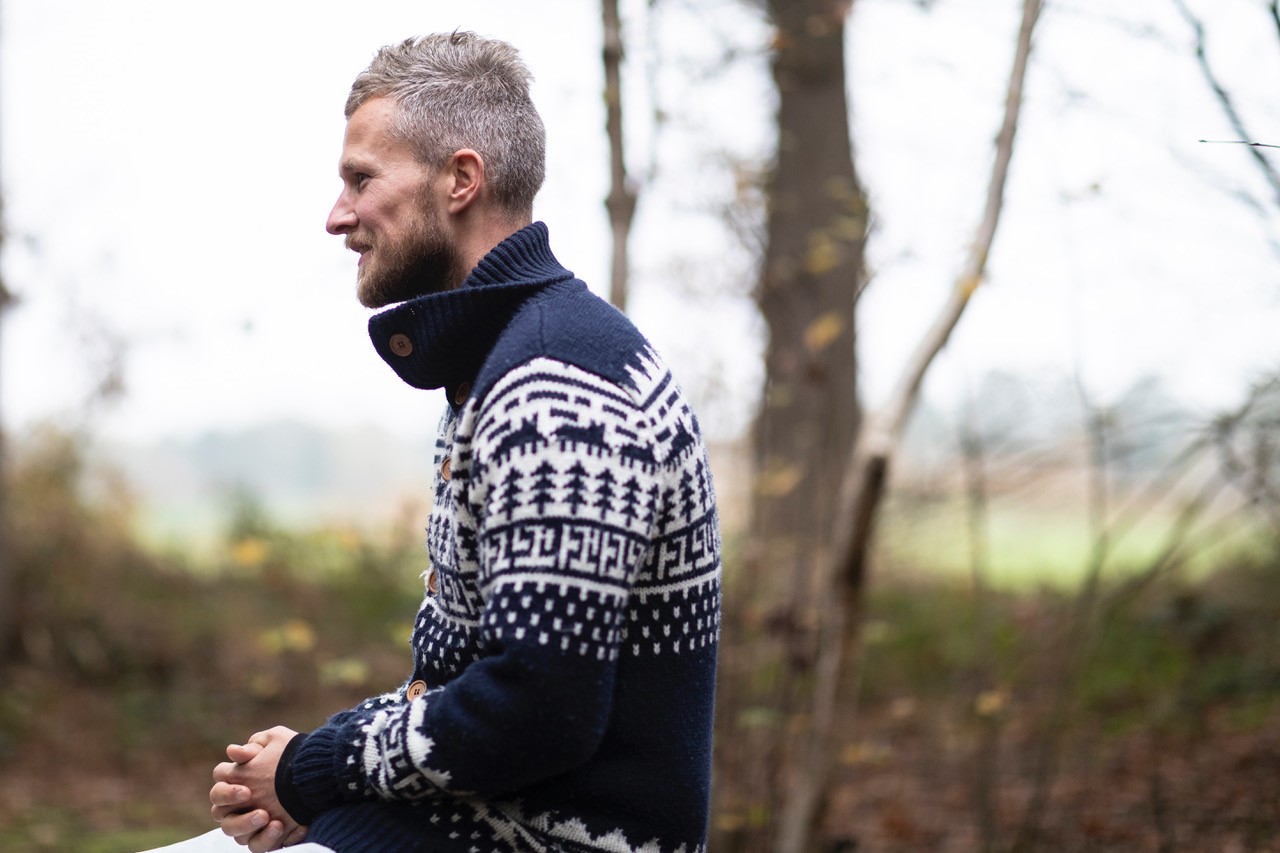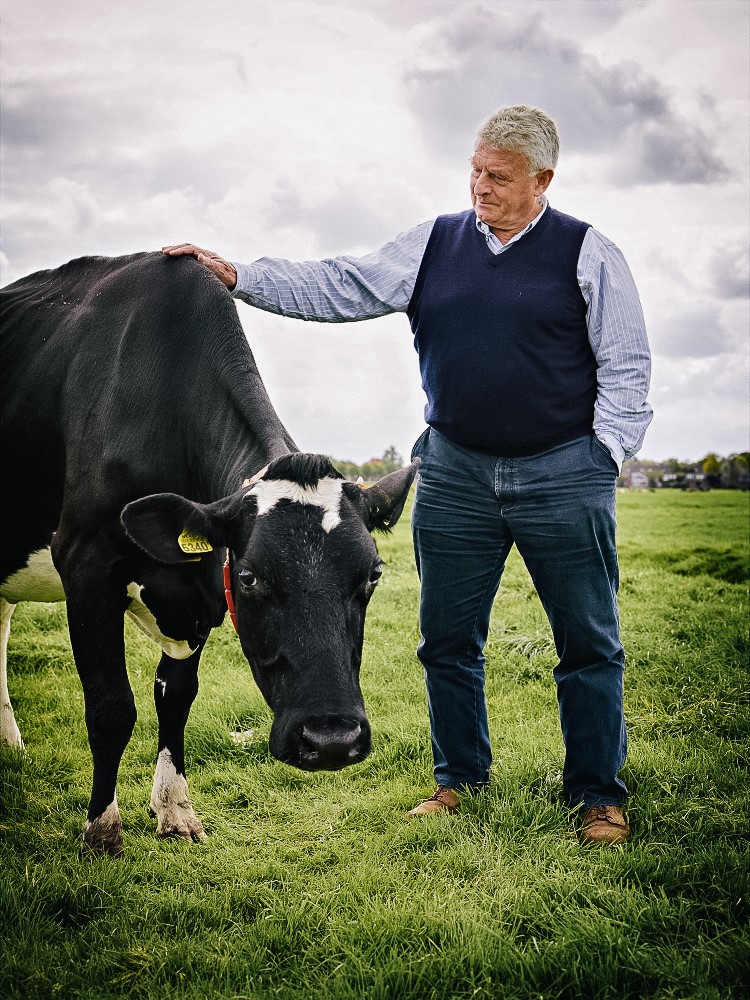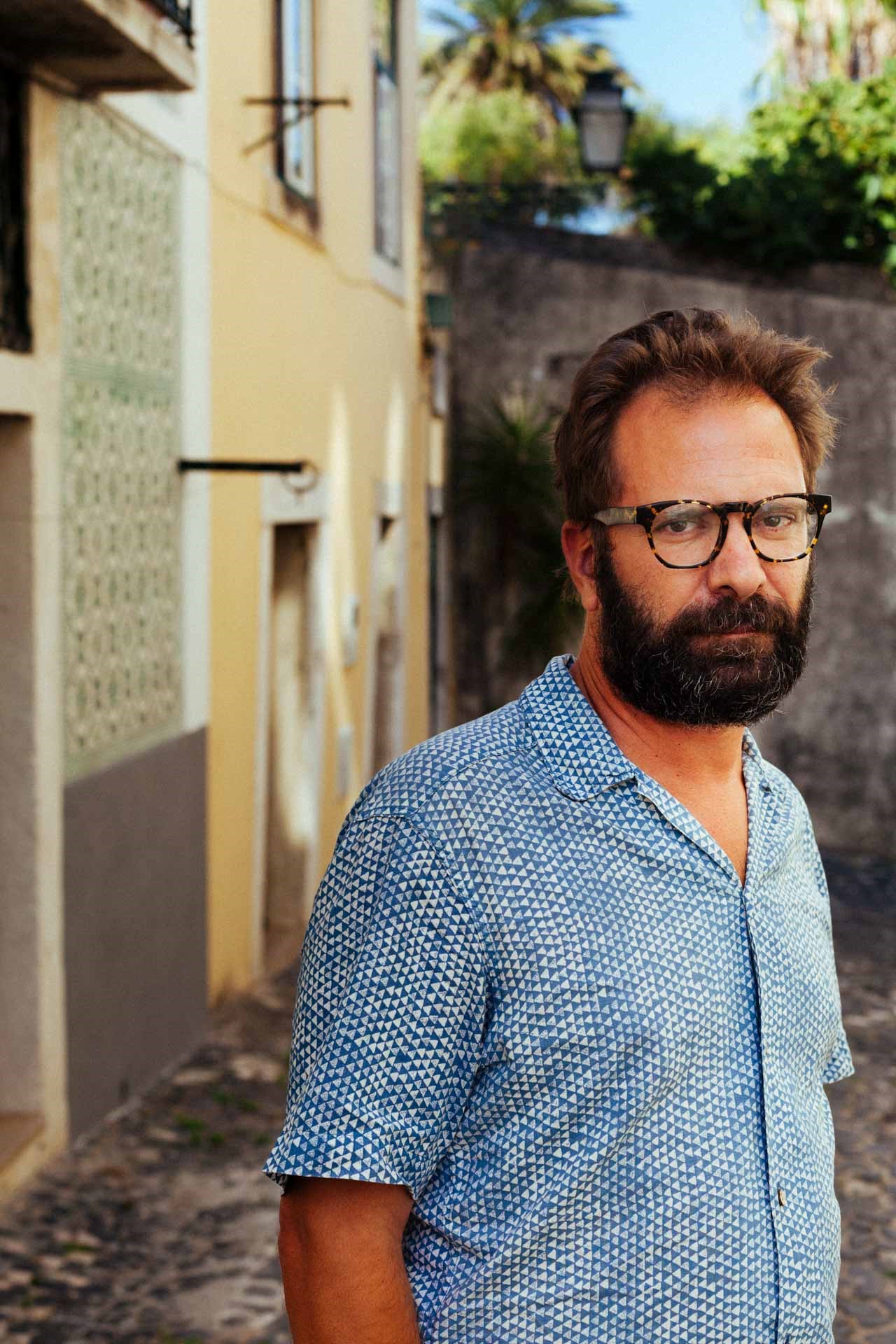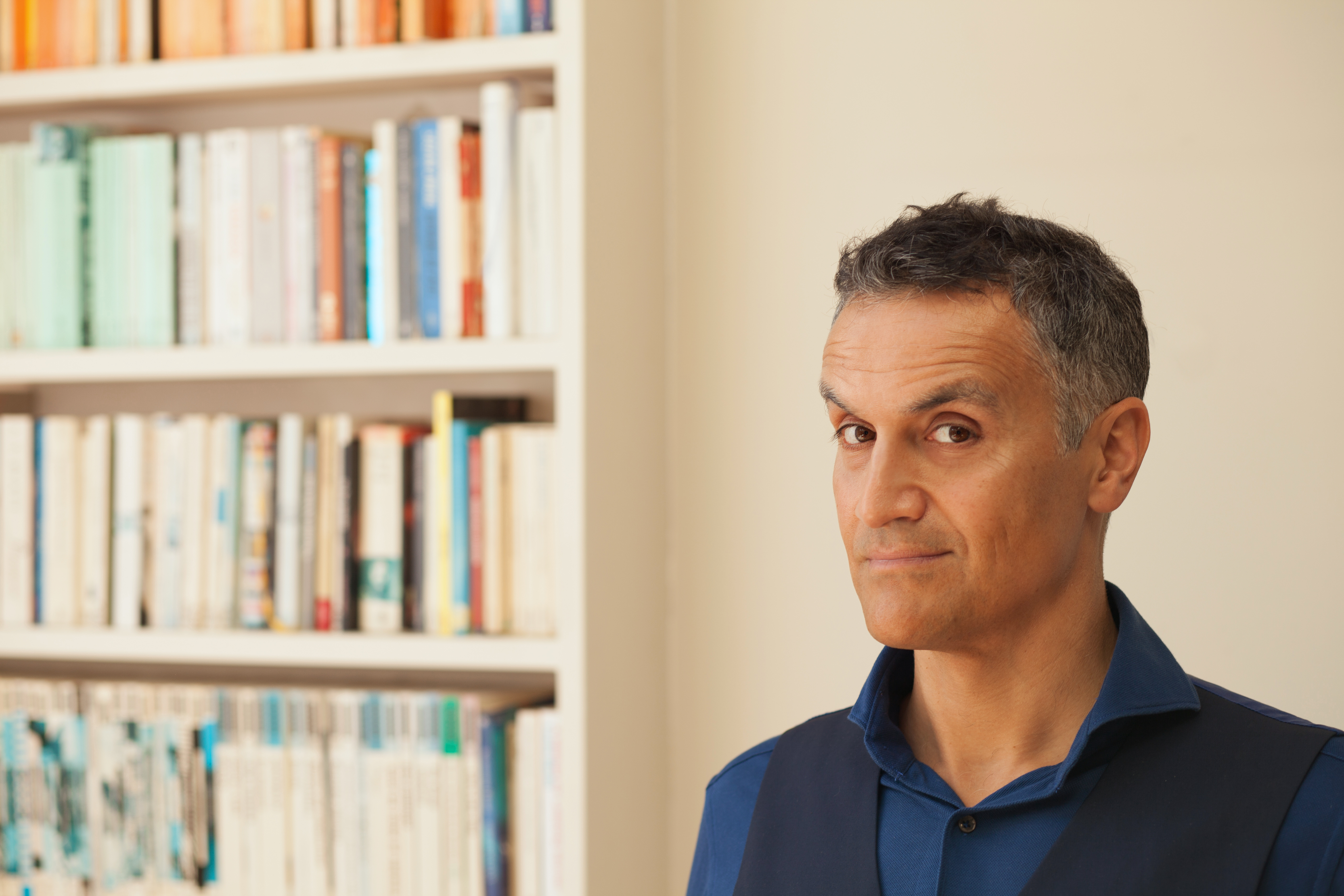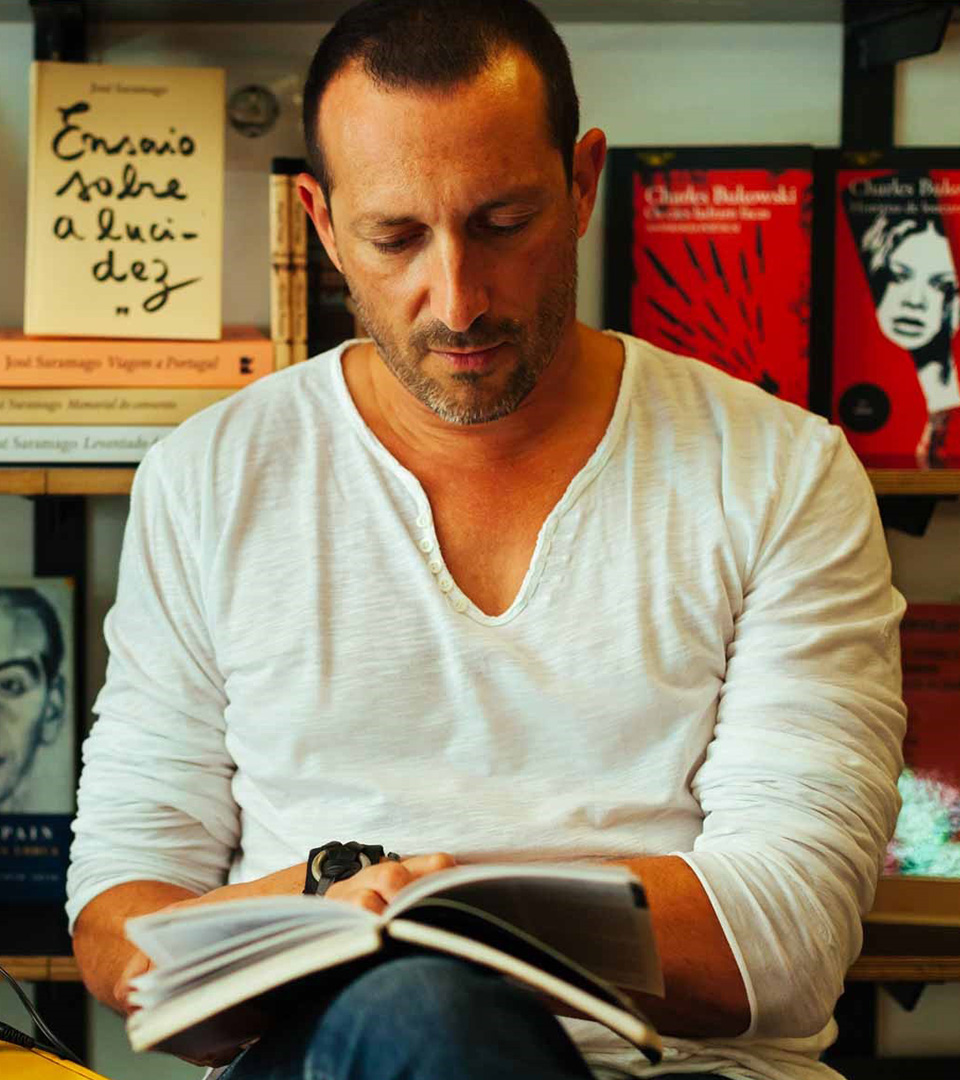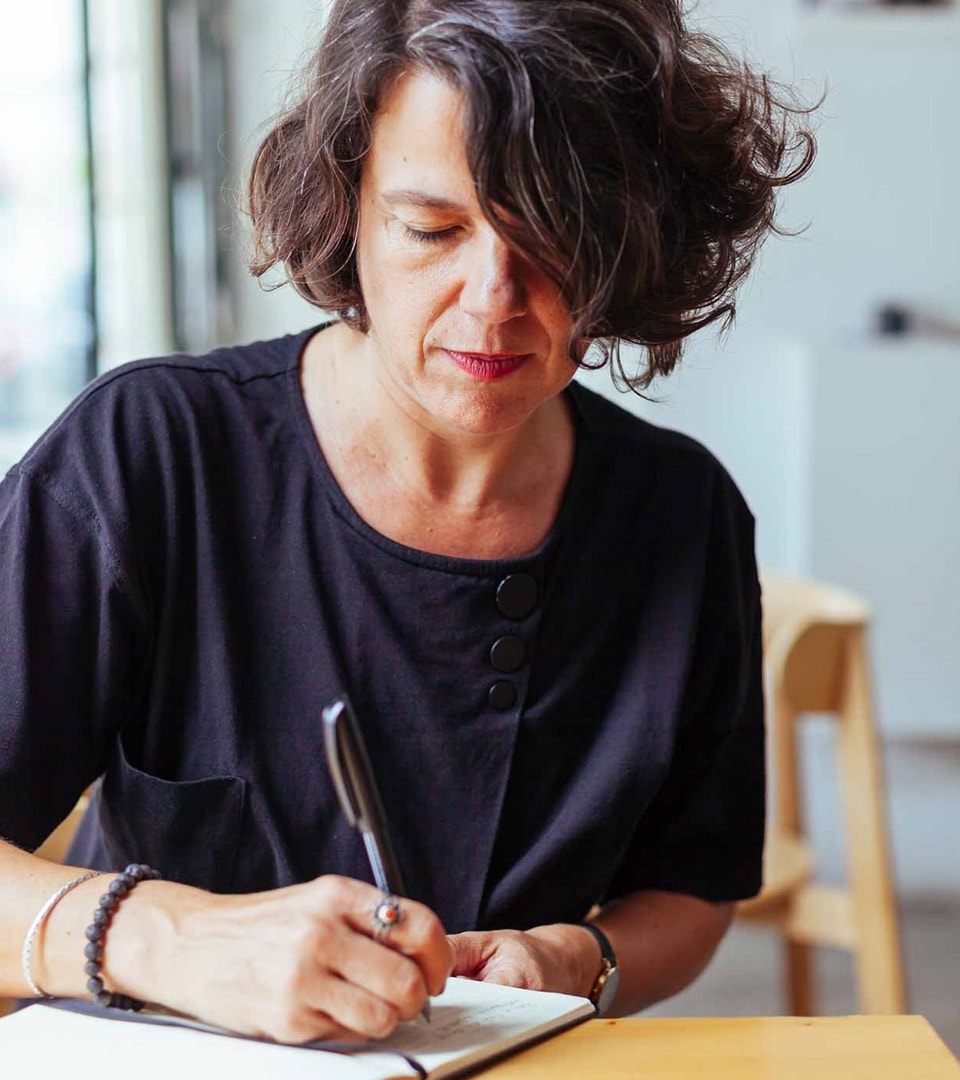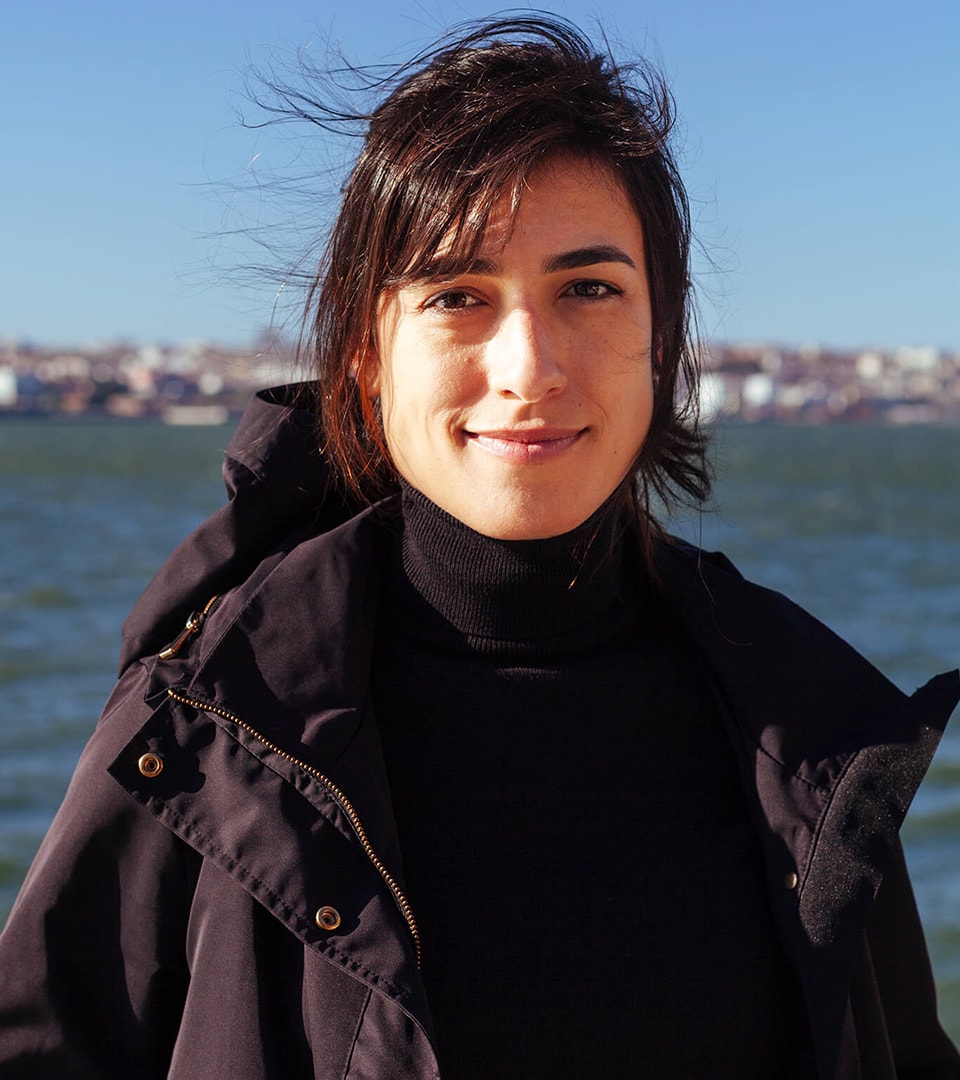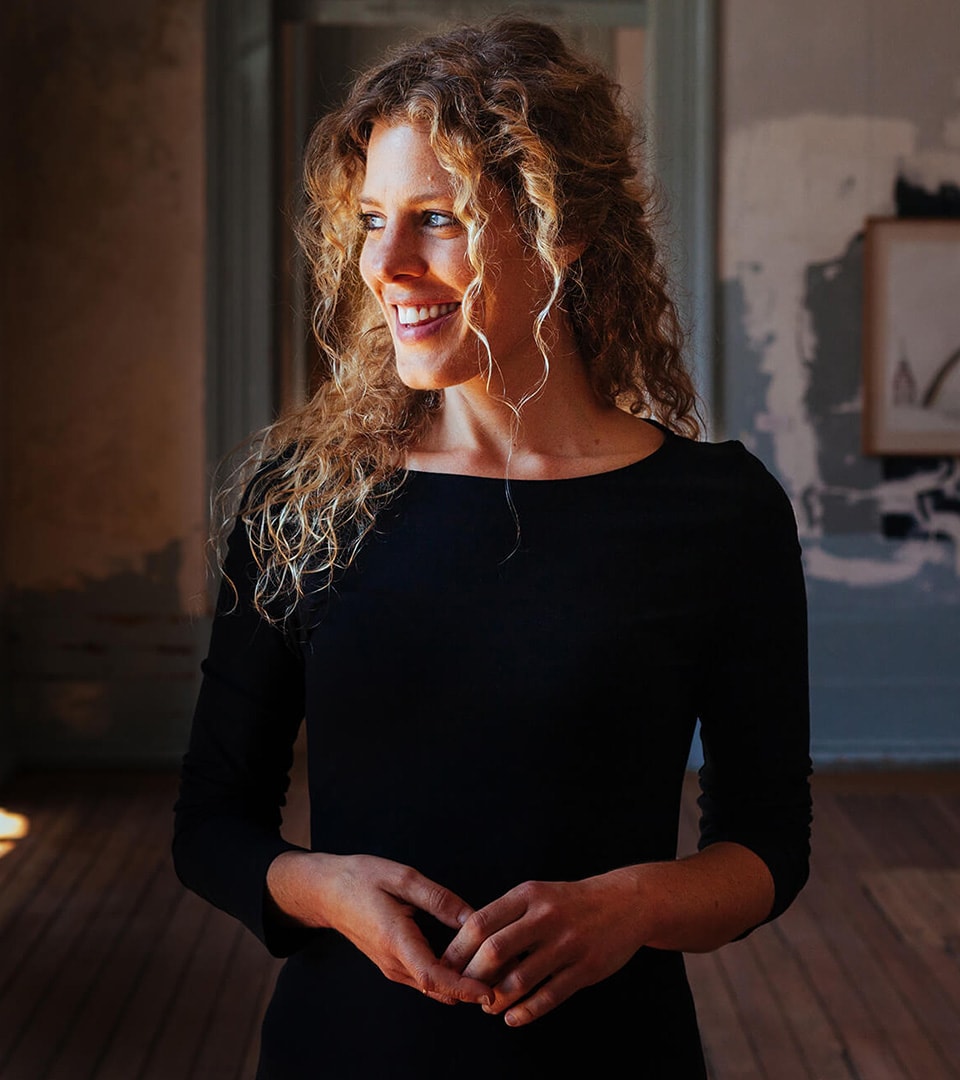JoannaHecker
Interviewed on 7 May 2019 over lunch at the Taberna Sal Grosso in Lisbon.
The art of wasting time
Fun fact: What do Malcolm X, Steven Seagal and Joanna Hecker have in common? They are all children of Lansing, capital of the state of Michigan, in the United States of America. The city is known for its automotive factories, and recognized for its university. From the union of these two worlds, blue collar family and white collar family, came the three Hecker sisters with Joanna in the middle. Because her parents worked in university administration, our interviewee practically grew up on campus, involved in studies in all areas. About 8 years ago she fell in love with a 16th-century Portuguese and moved from the hustle and bustle of New York to the quiet life of Lisbon.
Meanwhile, after completing a doctoral thesis in art history on Francisco de Holanda (the aforementioned Portuguese), she has been working on multiple fronts: co-organising (and offering inspiring introductions to) the bands that play at the Lisbon Living Room Sessions, being responsible for the area of international partnerships at the Lisbon Architecture Triennale, translations and various writing projects (including a book in progress) – that is, a series of activities that are a complete violation of her principles. What Joanna wants most is a quiet life, unplugged, boring and full of nothing – to fill with her family, her friends, her ideas, and her dog Milo.
"A friendship can fall into the category of family if we invest enough time."
"As I get older I feel that it is increasingly important to slow down and stop."
"I don’t absorb things: I get completely absorbed by them."
"Emptiness is fullness in another way: it is a space that can be filled with anything we want! To be empty is to be full of space."
"Time is not money. That is so wrong. Time is love. Time is life. Time is everything. Without time, we are nothing."
"In theory, when we run out of money, there are many ways to make more. When the time we have runs out, it’s over - we can’t make more."
"More and more, I’m trying to do less and less and less."
"The goal is to be able to slow down, stop, find silence and then see what happens. This is a kind of philosophical guideline for me."
"The value of all of those hours is immeasurable in a way that I can’t explain."
Is it possible to identify traits that Joanna inherited from both sides of the family? “On my mother’s side they are more affectionate, and express their feelings with ease. They are noisy, very loud, humble, and with lots of curly hair. Their origin is Serbian. On my father’s side they are smart – sometimes too smart: they tend to be critical, and easily disappointed. They always want more. They are wealthier, more educated, socially ambitious. They come from Germany and Ireland – which means they’re drinking buddies.”
The result of these two worlds seems very balanced, despite the curly hair that cannot be tamed. “I don’t know. Will I end up balanced, or bipolar? (laughs) Just to clarify, I don’t suffer from this disorder: I’ve already checked.”
Our conversation in a mixture of English and Portuguese is very fluid, and not just because the umami from lunch helps – but also because the interlocutor has a seductive speech, with breaks and dramatic repetitions, a little like Barack Obama whatever the theme – art, capitalism, or emptiness: “Time, time, time… is much more valuable than money” is something she will tell us, later on.
“Bonds don’t have to be blood. Relationships that fall into the category of family need authenticity, availability, and honesty over time. And also vulnerability, and joy and laughter. It’s the ability to accept each other (and the ways we change) in a flexible and adaptable way, in good and bad times, in good and bad moods. What defines family is being tested, side by side.” After ordering more wine, because the house jars seemed like tiny saké bottles, we made a toast and returned to the biological family. “I have two parents, two sisters, two brothers-in-law and my niece and nephew whom I love. We are a perfectly imperfect family. We all know each others faults, extremely well. They know how much of an asshole I can be, and I know how much they can be assholes. We’ve known this for a long time.”
Ennui, tedium, boredom: it doesn’t matter what the word is, but how one fills that space-time – or not. “We’re from a generation that still got bored.” She still remembers long summers with family, filling them in many ways, including just playing with mud and sticks. “It’s a privilege and I miss it. Embracing boredom is fundamental.” Mobile phones and computer screens not only obliterate boredom, but also steal the attention of our minds, that could be doing other things. One the one hand, boredom is something precious, to be occupied intelligently. “Even if I have absolutely nothing to do, there are billions of books I want to read, billions of words I want to write.” But on the other hand, it is a symptom of a worrisome disease: “an adult saying ‘Oh my god, I need to fill this void! I have to travel, I have to drink, I have to have sex with someone, I have to have anything. Social life! Social life! Social life! It is a lack of imagination and inner life.” It is no coincidence that these ideas sound like advice that the Buddha himself might have given: Joanna regularly practices yoga and meditation.
We heard somewhere that “people want to live forever, but then they don’t know what to do on a Sunday afternoon.” Joanna responded with an analysis of present-day individualism. “We are very individualistic, but we have such a terror of loneliness that we cannot bear to be our own company. So who is this individual who is so strong and sure of himself that he can’t stand to be alone with his thoughts for 5 minutes? Do you need distraction and company in order to avoid yourself?”
If you fall in love with a 16th-century man, you are clearly not of this age, right? “It all began with a question in which I was particularly interested: why do human beings love art? What is this power that leads kinds, emperors, governments to invest so much in works of art and architecture? There are several theories about the reasons behind Paleolithic cave paintings, for example, but the most seductive one holds that, at the time, the act of creating – far from being a luxury – was actually a way to intervene in reality. Everything seemed inexplicable and uncontrollable. Will the hunt be successful? Will it rain, or will it not? The gods were located in nature, in earth, so what better way to access the source of power than to go to the bowels of the earth – to the caves – and enter into communion with that divine power?” We know that the spaces where the cave paintings are found were never like galleries with cocktail parties on the opening day. Instead they were very difficult places to access, places for evocation – and she gives the example of the classic paintings in negative of the hands of these earlier hominids, made by the act of spitting pigment over the hand against the wall, a way to seem to penetrate the stone: “The human being enters the earth, accesses the power. The work is a point of access between this world and the other, between the profane and the divine. This is an idea that continues throughout the history of art.” When she stumbled upon this Portuguese artist, architect and writer, the researcher realized that he “was working with some of the most powerful images that Catholics considered to be points of access between these two worlds, venerated images of the Virgin and Child or of Jesus Christ, images that were (and are) considered as portals between two worlds.” To open that door it is enough to kneel, to make offerings, and to pray.
“It’s fascinating, a kind of gateway between worlds. I’m not a Catholic – it’s an anthropological fascination – and Francisco de Holanda wrote about exactly these points of contact between God and Man. He wrote in a way that no one had ever really written before. I was a little obsessed with him, partly because these texts weren’t translated into English. I had to study Portuguese to get as close as possible to the source and try to figure out who he was.” Some glimpses of Francisco’s mind emerged from the marginal notes and underlined phrases in the books that had belonged to him, in the collection of the Biblioteca Nacional or at the Escorial outside of Madrid. One of the advantages of growing up on a university campus is eventually being able to see, up close and wearing white gloves, drawings by Michelangelo in the British Museum or countless “relics of shared experience, of suffering, of curiosity, of human adventures.” For those who have little time, the synopsis of this love story is simple: “I’m not well suited to the times we live in. Francisco de Holanda is just the symptom of the disease.”
Our eternal researcher has a feature that some people find annoying: she likes to have her phone without sound, without notifications, without social networks and without email. “They say I’m hard to reach and I confess that I’m a little proud of it. I guess it can be frustrating, taking 5 hours to respond to something urgent…” Joanna would be completely off social networks if it weren’t for her work with the Lisbon Living Room Sessions: “I don’t like my smartphone. I take notes by hand, use a paper calendar and always carry a notebook.”
So being slow is a good thing? “Absolutely. I struggle with obstacles – resistance and criticism – but as I get older I feel that it is increasingly important to slow down and stop.” What is it, to be older? Aren’t we getting older from the second we are born? “I started thinking about it before I actually got older. (laughs)”
According to Joanna’s experience and observation, the role of women in society is a social construction largely based on physical appearance. This is the bargaining chip for women (with its associated expiration date), more than how they think or how they interact with others. “My concept of aging is directly linked to the fact that I am a woman. I am 40 years old and single, and many of the men my age date girls 15 years younger than me. For some reason, men were raised to value what a 25-year-old woman can offer to them.”
When we start talking about the “others,” Joanna says: “The others are the ones who are something I am not.” The writer Miguel de Unamuno may have said that “fascism is cured by reading and racism is cured by traveling” but is that so? What if the reader or the traveler is narrow-minded at the eye level? “I have seen many Westerners travel in Southeast Asia who had their eyes closed to the people around them. A superficial person who travels can remain superficial, selfish and closed when he or she returns. It’s very easy to use the world like a manifestation of my own narcissistic superiority.” This theme touches on a number of recent expressions: “voluntourism,” i.e. volunteer tourism by more or less public figures, virtue signalling, poverty porn and the famous white savior complex that accompanies many trips to Africa. Joanna couldn’t be more different from these figures; in fact, she has only traveled once with a backpack on her back. “I don’t travel, I move to a place. I stay there. I rent a house, and I learn the language.” Getting to know countries and cultures like this seems to be the best way to be, and to absorb more. “I don’t absorb things, I get completely absorbed by them. I don’t know, I’m not sure if it’s a good thing, because sometimes I get lost.” But isn’t a person losing oneself voluntarily one of the most wonderful activities in the world? “Is it possible that it’s the best and worst at the same time? Total surrender is wonderful but also very dangerous. You dissipate. And when we lose everything, how do we rebuild?”
There is a book that has accompanied the Lisboan Joanna, The Lonely City by Olivia Laing, which addresses the gentrification of emotions. “It’s about the tendency to evaporate everything that’s unpleasant. It can be loneliness, sadness, anger, pain, uncertainty, whatever it is. But when positive thoughts are superimposed over everything, life becomes two-dimensional, without soul, without dripping blood, artificial. The truth is that in real life there is feces, blood, dirt and death. People are constantly selling an idea of themselves, networking and advertising themselves as a product. It’s just like the gentrification of cities, which cleanses people’s spaces and scrubs away undesirable aesthetics.”
Joanna doesn’t hesitate to say that we live in superficial times. When we ask her for a recipe to reverse the situation, we realize that she asks herself this question every day. “Every single day. I feel deep in my bones this desire to live in a more profound way.” For most of human history there was no time for superficiality: we were too busy trying to survive black plagues, barbaric invasions, wars, diseases caused by industrialization. “I can tell you what I do: I spend a lot of time alone, reading and writing. For me, to be alone means to be free from the influence of the minds of others.”
There’s a seemingly paradoxical idea here. Knowing how to be alone is fundamental for having something to give to others. “I love people and my friends, but it’s the time I spend alone that helps me cultivate a richer self that I can share. If I don’t, when I’m with other people I don’t have anything unique to offer – I’m just regurgitating what I’ve received from conversations, from Netflix, bla bla bla, I don’t have anything that’s mine, with added value coming from me.”
When asked, the singer Mayra Andrade (whom Joanna presented at the Lisbon Living Room Session on 24 September 2017 as someone who “transcends categorization”) what songs she listens to when she is alone, the immediate answer was not a playlist, but “when I am alone I need silence. Without silence I can’t write music.” For Joanna, “isolation is crucial but it’s not always fun. There are times when I hate my company. Sometimes I desperately need someone’s company to get me out of my head. But maybe those are the times when we have to learn to stay, not panic, and see if there is anything fertiile there. If we constantly run away from this space, we’ll never realize what’s there.”
Do we have time for a musical interlude? Thanks. In 2014 Joanna and Ricardo Lopes (interview here) had several things in common, and a passion for American jazz was one of them. That same year, Joanna went back to New York, and discovered that her friends John and Colleen were serving up a wonderful cocktail made of live music, friends, a small house in Brooklyn Heights, and wine. Back in Lisbon, Joanna planned the next steps with Ricardo, and decided to do something similar – with the door open to jazz, fado, folk, blues, flamenco and even classical music. A musical project as intimate as a sofa was born, first at home, and then in living rooms scattered around the capital. In the inaugural post, of December 2014 (link), we can read this: “The Living Room Sessions are inspired by the tertúlia, the salon, the Stammtisch (Viennese coffee house, literally “captive table”) to create an intimatae forum for people.” And so it was, with the generosity of many people, and the support of Esporão since the second concert. It’s worth reading the post “Why Are You Here?” from January of this year (link) to find out a little more about the almost religious surrender to the cause.
And now back to the more philosophical questions that occupy Joanna’s mind, such as the duality of full versus empty: “It is true that I am not entirely of this moment. If we’re not busy, we’re worthless, right? This idea is so rooted in us that the ability to stop, to be alone, to slow down seems to indicate that we are not important. I work consciously to counter that prejudice.”
“Emptiness is just another way of looking at potential. Emptiness is immanence, it is fullness in another form, it is a space that can be filled with anything we want! To be empty is to be full of space. And how fucking beautiful is that?”
All of this is linked to the concept of slowness, to slowing down to the point where you can really stop and assimilate what surrounds you. For a beach to be paradisiacal, it’s essential that it be empty, right? “It’s the same in the country. Since the agricultural revolution in ancient Mesopotamia, farmers have known that a plot of land – in order to be fertile and give rise to good harvests – needs a fallow period, a time when it is resting, without seeds, without stimulus. It’s just to let it rest. And it’s not that it’s dead – it’s that it is regenerating life.” But it seems that in 2019 no one much values fallow time, and the culprits are various -isms: individualism, capitalism, and neoliberalism.
The fight goes on with plenty of idealism. “I believe that the forms of capitalism that make the world run have their days numbered. It has become unsustainable. I would like to live in a society where the forms of femininity and masculinity are gentler. Maybe the time and place where I would like to live does not exist yet. I’m so aware of misogyny and toxic masculinity, especially in Portugal. Perhaps I would like to live in a kind of hippie utopian community, like those imagined in the 60s and 70s in the USA. Many of these values still resonate deeply within me. My parents were hippies in their way, and they raised us with some of those values. I have always been a bit of a political activist.” Like her compatriot, Malcolm X.
“Fundamentally we need more respect for the planet and for all conscious beings, human and non-human. Next perhaps we need more mutual respect, between sexes and genders, and a clear understanding that gender is a spectrum, man, woman, and a series of things in between.” And we come to the million-dollar activist proposal, a new definition of value. “Money as the main measure of value? Really? That’s fucked up. We need to change that. In my ideal society we would have a kind of exchange system.” Milk for eggs, texts for a good meal, a massage for a song – there are no limits for utopias. “Although I am a product of globalization – after all, I am an immigrant – many of the solutions we need are local. They are our neighbors. Jane Jacobs is one of my current heroes and her book, The Death and Life of Great American Cities, is my bible. It’s about communities and how they form. The street life that connects us to each other, the interactive co-identification that leads us to care about each other, even when others are not family or friends. The trick is to take a deep root in our neighborhoods and communities, but then, from there, to give equal value to people who are doing the same thing on the other side of the planet, in other neighborhoods and communities.”
This movement “is happening here and now and we need to give our energy and our time. Time, time, time,… is much more valuable than money. Time is not money. That is so wrong. Time is love. Time is life. Time is everything. Without it, we are nothing. In theory, when we run out of money, there are many ways to make more. When we run out of time, it’s over, we can’t make more.”
After the next sentence, no one will ever again make it to a meeting with Joanna on time (and she is the first to say so). “When someone arrives half an hour late for lunch with me, I could say, ‘You’re wasting my time!’ Time that would be devoted to another meeting, phone call, or email. But I’ve just been given 30 minutes full of nothing! Which is precious. It’s a guilt-free opportunity to sit with an empty page in my notebook.”
With her work for the Trienal, Joanna constantly focuses on the effect of the passage of time on works of architecture that can stand for centuries and centuries. “It gives us a sense of perspective. On the one hand, the things we build last much longer than we do, which makes us feel small. On the other hand, even the buildings fall down. A building that’s 500 years old now is very different from what it was when it was built. A body, an identity, a building – everything is in transformation.”
“Everything is impermanence, no matter how much we try to resist.” And so the conversation comes to the concept of slow living, and another book. “More and more and more, I’m trying to do less and less and less.” How to Do Nothing: Resisting the Attention Economy, by Jenny Odell, is a work that aims to recover kidnapped attention from the economy that profits from capturing the attention of consumers.
To what extent did the “Portuguese slowness” seduce our interviewee to move from one of the world’s most hurried cities (New York) to Lisbon? The answer lauds the typical long meals of the Portuguese, but leaves us on guard: if it were today, maybe Joanna would go to a country with more hippies than hipsters, more time-out than burnouts. Interestingly, a few days after this interview, the World Health Organization revealed its updated list of diseases, which includes two symptomatic novelties: disorders associated with the intensive playing of video games, and burnout – or professional burnout syndrome.
“The people I got to know here had time for each other in a way that seemed impossible for my group of friends in New York. It’s those three-hour lunches without any problem. It’s the dinners that start at 10 pm and end at 1 am, even if it means being late for work the next day. It’s an understanding. The question is, I think that in the seven and a half years that I’ve lived here, this has changed. Lisbon in particular has absorbed that culture of productivity, hurrying and networking all the time. Startups, digital nomads, crowdfundings, co-fundings, networking, this whole digital scene…” and the sentence ends with a long sigh.
Is it possible to reverse the situation? Apparently not. “Too many people are drunk with all of this attention,” she tells us with a pessimism layered with skepticism, that has recently been galvanized by the slow optimism of Carl Honoré. The author of the book The Slow Movement (published in 2006 by Estrela Polar) is the main spokesperson of the Slow Movement and was recently in Lisbon, for the purpose of disseminating the study and subsequent debate on a more peaceful lifestyle, hosted by the Universidade Católica Portuguesa at the request of Esporão.
In this debate, Joanna discussed with Carl if the Slow Movement isn’t an ideology reserved for privileged people who can afford to stop. “Those of us who have problems paying the bills every month cannot necessarily say, ‘I’m going to dinner for 5 hours because people are important.’ There are few people addressing this aspect of elitism, and sometimes they even fall into this exaggerated poverty porm, like “Oh yes, I’ve been traveling around Brazil, and those poor fishermen really know what slow life is!’ Yes, they may know, but let’s not glamorize the inactivity of poverty.”
The work that she has developed with the Triennale has already brought our Slow Forward ambassador into contact with numerous thinkers of seductive ideas. “The architect Stephen Bates does fascinating work of building homes for adults in their 40s, in their 50s, in the early stages of dementia. We are talking about people who begin to get lost on the way between the bed and the bathroom, and it’s necessary for them to have clues along the routes to help them. The point is to get into someone’s brain to design an external environment and, as you might expect, Stephen practices meditation: he spends time exploring his own internal territory. During a coffee that we shared after the lecture that he came to give in Lisbon, we spoke of the importance of slowing down, of getting in tune with the mind itself and questioning what reality is.”
Another thinker that Joanna couldn’t leave aside is one of the curators of this year’s Triennale, Sébastien Marot, who will open the exhibition “Agriculture and Architecture: Taking the Country’s Side,” on the relationship between agriculture and architecture through the lens of permaculture (an idealistic philosophy that encourages harmonious, sustainable and more permanent relationships between natural cycles, plants, animals, water management and human needs.
“It involves questioning, as much in theory as in practice, how things were done a long time ago, the ancient methods of producing food, cultivating the land, and building settlements. Perhaps it’s necessary to occupy a territory for an entire year before building wisely, to know where the sun hits in winter and summer… The techniques used by the architects of Herdade do Esporão reflect this philosophy – have you talked to them?” Soon, see the interview with Pedro Jervell, of the architectural studio Skrei. “The natural ways of regulating temperature and humidity, the way buildings breathe, it’s all part of the reason why this conversation between the Triennale and Esporão makes so much sense.”
And so the interview goes on for a long time, so that one who thinks that the art of not wasting time would be to expect Netflix to transform Joanna’s thinking into a documentary series. However, this would be a violation of principles – and the last stone is still missing, back in Michigan, a region of many lakes, lakes so immense that they look more like seas. “I have this image, which always stays with me, of my mother. Hours and hours and hours walking on the beach, with her hands behind her back, looking at the ground and picking up stones. And she has her own criteria for what makes a stone worth picking up. Our criteria are different. This stone (she shows us) us round, small and smooth. It fits in my hand and always comes with me. It has two functions. It makes me think of my mother, and my home. It also makes me think of that delicious and useless way of spending time. To waste time. It has no purpose, no function, no value. It’s just the collection of stones, which will sit in a jar, in a house. But the value of all of those hours is immeasurable in a way that I can’t explain.”
If Joanna’s stone reminds her of the walks with her mother on one hand, it reminds her of s slightly larger stone, on the other hand. “There is a phrase from the Dhammapada, a sacred Buddhist text, that says ‘still as the stone at the door.’ Let us visualize an open door with a stone that holds it. What the stone does is to keep the door open, to everything and everyone. The stone does not say, ‘no, no, no, you cannot enter,’ the stone just opens the door, without opinions, without meddling, without intervening, without approving, without rejecting. This stone reminds me of that quality, of keeping quiet and observing life as it passes forwards and backwards, inside and outside. I aspire to be the stone.”
Thank you for your time. If you happen to pass through Lansing, remember that it is the birthplace of Malcolm X, a human rights activist who marked his era; Steven Segal, a martial arts actor whose career has already passed its time; and Joanna Hecker, a full-time idealist who knows how to stop time.
Fun fact: What do Malcolm X, Steven Seagal and Joanna Hecker have in common? They are all children of Lansing, capital of the state of Michigan, in the United States of America. The city is known for its automotive factories, and recognized for its university. From the union of these two worlds, blue collar family and white collar family, came the three Hecker sisters with Joanna in the middle. Because her parents worked in university administration, our interviewee practically grew up on campus, involved in studies in all areas. About 8 years ago she fell in love with a 16th-century Portuguese and moved from the hustle and bustle of New York to the quiet life of Lisbon.
Meanwhile, after completing a doctoral thesis in art history on Francisco de Holanda (the aforementioned Portuguese), she has been working on multiple fronts: co-organising (and offering inspiring introductions to) the bands that play at the Lisbon Living Room Sessions, being responsible for the area of international partnerships at the Lisbon Architecture Triennale, translations and various writing projects (including a book in progress) – that is, a series of activities that are a complete violation of her principles. What Joanna wants most is a quiet life, unplugged, boring and full of nothing – to fill with her family, her friends, her ideas, and her dog Milo.
"A friendship can fall into the category of family if we invest enough time."
"As I get older I feel that it is increasingly important to slow down and stop."
"I don’t absorb things: I get completely absorbed by them."
"Emptiness is fullness in another way: it is a space that can be filled with anything we want! To be empty is to be full of space."
"Time is not money. That is so wrong. Time is love. Time is life. Time is everything. Without time, we are nothing."
"In theory, when we run out of money, there are many ways to make more. When the time we have runs out, it’s over - we can’t make more."
"More and more, I’m trying to do less and less and less."
"The goal is to be able to slow down, stop, find silence and then see what happens. This is a kind of philosophical guideline for me."
"The value of all of those hours is immeasurable in a way that I can’t explain."
Is it possible to identify traits that Joanna inherited from both sides of the family? “On my mother’s side they are more affectionate, and express their feelings with ease. They are noisy, very loud, humble, and with lots of curly hair. Their origin is Serbian. On my father’s side they are smart – sometimes too smart: they tend to be critical, and easily disappointed. They always want more. They are wealthier, more educated, socially ambitious. They come from Germany and Ireland – which means they’re drinking buddies.”
The result of these two worlds seems very balanced, despite the curly hair that cannot be tamed. “I don’t know. Will I end up balanced, or bipolar? (laughs) Just to clarify, I don’t suffer from this disorder: I’ve already checked.”
Our conversation in a mixture of English and Portuguese is very fluid, and not just because the umami from lunch helps – but also because the interlocutor has a seductive speech, with breaks and dramatic repetitions, a little like Barack Obama whatever the theme – art, capitalism, or emptiness: “Time, time, time… is much more valuable than money” is something she will tell us, later on.
“Bonds don’t have to be blood. Relationships that fall into the category of family need authenticity, availability, and honesty over time. And also vulnerability, and joy and laughter. It’s the ability to accept each other (and the ways we change) in a flexible and adaptable way, in good and bad times, in good and bad moods. What defines family is being tested, side by side.” After ordering more wine, because the house jars seemed like tiny saké bottles, we made a toast and returned to the biological family. “I have two parents, two sisters, two brothers-in-law and my niece and nephew whom I love. We are a perfectly imperfect family. We all know each others faults, extremely well. They know how much of an asshole I can be, and I know how much they can be assholes. We’ve known this for a long time.”
Ennui, tedium, boredom: it doesn’t matter what the word is, but how one fills that space-time – or not. “We’re from a generation that still got bored.” She still remembers long summers with family, filling them in many ways, including just playing with mud and sticks. “It’s a privilege and I miss it. Embracing boredom is fundamental.” Mobile phones and computer screens not only obliterate boredom, but also steal the attention of our minds, that could be doing other things. One the one hand, boredom is something precious, to be occupied intelligently. “Even if I have absolutely nothing to do, there are billions of books I want to read, billions of words I want to write.” But on the other hand, it is a symptom of a worrisome disease: “an adult saying ‘Oh my god, I need to fill this void! I have to travel, I have to drink, I have to have sex with someone, I have to have anything. Social life! Social life! Social life! It is a lack of imagination and inner life.” It is no coincidence that these ideas sound like advice that the Buddha himself might have given: Joanna regularly practices yoga and meditation.
We heard somewhere that “people want to live forever, but then they don’t know what to do on a Sunday afternoon.” Joanna responded with an analysis of present-day individualism. “We are very individualistic, but we have such a terror of loneliness that we cannot bear to be our own company. So who is this individual who is so strong and sure of himself that he can’t stand to be alone with his thoughts for 5 minutes? Do you need distraction and company in order to avoid yourself?”
If you fall in love with a 16th-century man, you are clearly not of this age, right? “It all began with a question in which I was particularly interested: why do human beings love art? What is this power that leads kinds, emperors, governments to invest so much in works of art and architecture? There are several theories about the reasons behind Paleolithic cave paintings, for example, but the most seductive one holds that, at the time, the act of creating – far from being a luxury – was actually a way to intervene in reality. Everything seemed inexplicable and uncontrollable. Will the hunt be successful? Will it rain, or will it not? The gods were located in nature, in earth, so what better way to access the source of power than to go to the bowels of the earth – to the caves – and enter into communion with that divine power?” We know that the spaces where the cave paintings are found were never like galleries with cocktail parties on the opening day. Instead they were very difficult places to access, places for evocation – and she gives the example of the classic paintings in negative of the hands of these earlier hominids, made by the act of spitting pigment over the hand against the wall, a way to seem to penetrate the stone: “The human being enters the earth, accesses the power. The work is a point of access between this world and the other, between the profane and the divine. This is an idea that continues throughout the history of art.” When she stumbled upon this Portuguese artist, architect and writer, the researcher realized that he “was working with some of the most powerful images that Catholics considered to be points of access between these two worlds, venerated images of the Virgin and Child or of Jesus Christ, images that were (and are) considered as portals between two worlds.” To open that door it is enough to kneel, to make offerings, and to pray.
“It’s fascinating, a kind of gateway between worlds. I’m not a Catholic – it’s an anthropological fascination – and Francisco de Holanda wrote about exactly these points of contact between God and Man. He wrote in a way that no one had ever really written before. I was a little obsessed with him, partly because these texts weren’t translated into English. I had to study Portuguese to get as close as possible to the source and try to figure out who he was.” Some glimpses of Francisco’s mind emerged from the marginal notes and underlined phrases in the books that had belonged to him, in the collection of the Biblioteca Nacional or at the Escorial outside of Madrid. One of the advantages of growing up on a university campus is eventually being able to see, up close and wearing white gloves, drawings by Michelangelo in the British Museum or countless “relics of shared experience, of suffering, of curiosity, of human adventures.” For those who have little time, the synopsis of this love story is simple: “I’m not well suited to the times we live in. Francisco de Holanda is just the symptom of the disease.”
Our eternal researcher has a feature that some people find annoying: she likes to have her phone without sound, without notifications, without social networks and without email. “They say I’m hard to reach and I confess that I’m a little proud of it. I guess it can be frustrating, taking 5 hours to respond to something urgent…” Joanna would be completely off social networks if it weren’t for her work with the Lisbon Living Room Sessions: “I don’t like my smartphone. I take notes by hand, use a paper calendar and always carry a notebook.”
So being slow is a good thing? “Absolutely. I struggle with obstacles – resistance and criticism – but as I get older I feel that it is increasingly important to slow down and stop.” What is it, to be older? Aren’t we getting older from the second we are born? “I started thinking about it before I actually got older. (laughs)”
According to Joanna’s experience and observation, the role of women in society is a social construction largely based on physical appearance. This is the bargaining chip for women (with its associated expiration date), more than how they think or how they interact with others. “My concept of aging is directly linked to the fact that I am a woman. I am 40 years old and single, and many of the men my age date girls 15 years younger than me. For some reason, men were raised to value what a 25-year-old woman can offer to them.”
When we start talking about the “others,” Joanna says: “The others are the ones who are something I am not.” The writer Miguel de Unamuno may have said that “fascism is cured by reading and racism is cured by traveling” but is that so? What if the reader or the traveler is narrow-minded at the eye level? “I have seen many Westerners travel in Southeast Asia who had their eyes closed to the people around them. A superficial person who travels can remain superficial, selfish and closed when he or she returns. It’s very easy to use the world like a manifestation of my own narcissistic superiority.” This theme touches on a number of recent expressions: “voluntourism,” i.e. volunteer tourism by more or less public figures, virtue signalling, poverty porn and the famous white savior complex that accompanies many trips to Africa. Joanna couldn’t be more different from these figures; in fact, she has only traveled once with a backpack on her back. “I don’t travel, I move to a place. I stay there. I rent a house, and I learn the language.” Getting to know countries and cultures like this seems to be the best way to be, and to absorb more. “I don’t absorb things, I get completely absorbed by them. I don’t know, I’m not sure if it’s a good thing, because sometimes I get lost.” But isn’t a person losing oneself voluntarily one of the most wonderful activities in the world? “Is it possible that it’s the best and worst at the same time? Total surrender is wonderful but also very dangerous. You dissipate. And when we lose everything, how do we rebuild?”
There is a book that has accompanied the Lisboan Joanna, The Lonely City by Olivia Laing, which addresses the gentrification of emotions. “It’s about the tendency to evaporate everything that’s unpleasant. It can be loneliness, sadness, anger, pain, uncertainty, whatever it is. But when positive thoughts are superimposed over everything, life becomes two-dimensional, without soul, without dripping blood, artificial. The truth is that in real life there is feces, blood, dirt and death. People are constantly selling an idea of themselves, networking and advertising themselves as a product. It’s just like the gentrification of cities, which cleanses people’s spaces and scrubs away undesirable aesthetics.”
Joanna doesn’t hesitate to say that we live in superficial times. When we ask her for a recipe to reverse the situation, we realize that she asks herself this question every day. “Every single day. I feel deep in my bones this desire to live in a more profound way.” For most of human history there was no time for superficiality: we were too busy trying to survive black plagues, barbaric invasions, wars, diseases caused by industrialization. “I can tell you what I do: I spend a lot of time alone, reading and writing. For me, to be alone means to be free from the influence of the minds of others.”
There’s a seemingly paradoxical idea here. Knowing how to be alone is fundamental for having something to give to others. “I love people and my friends, but it’s the time I spend alone that helps me cultivate a richer self that I can share. If I don’t, when I’m with other people I don’t have anything unique to offer – I’m just regurgitating what I’ve received from conversations, from Netflix, bla bla bla, I don’t have anything that’s mine, with added value coming from me.”
When asked, the singer Mayra Andrade (whom Joanna presented at the Lisbon Living Room Session on 24 September 2017 as someone who “transcends categorization”) what songs she listens to when she is alone, the immediate answer was not a playlist, but “when I am alone I need silence. Without silence I can’t write music.” For Joanna, “isolation is crucial but it’s not always fun. There are times when I hate my company. Sometimes I desperately need someone’s company to get me out of my head. But maybe those are the times when we have to learn to stay, not panic, and see if there is anything fertiile there. If we constantly run away from this space, we’ll never realize what’s there.”
Do we have time for a musical interlude? Thanks. In 2014 Joanna and Ricardo Lopes (interview here) had several things in common, and a passion for American jazz was one of them. That same year, Joanna went back to New York, and discovered that her friends John and Colleen were serving up a wonderful cocktail made of live music, friends, a small house in Brooklyn Heights, and wine. Back in Lisbon, Joanna planned the next steps with Ricardo, and decided to do something similar – with the door open to jazz, fado, folk, blues, flamenco and even classical music. A musical project as intimate as a sofa was born, first at home, and then in living rooms scattered around the capital. In the inaugural post, of December 2014 (link), we can read this: “The Living Room Sessions are inspired by the tertúlia, the salon, the Stammtisch (Viennese coffee house, literally “captive table”) to create an intimatae forum for people.” And so it was, with the generosity of many people, and the support of Esporão since the second concert. It’s worth reading the post “Why Are You Here?” from January of this year (link) to find out a little more about the almost religious surrender to the cause.
And now back to the more philosophical questions that occupy Joanna’s mind, such as the duality of full versus empty: “It is true that I am not entirely of this moment. If we’re not busy, we’re worthless, right? This idea is so rooted in us that the ability to stop, to be alone, to slow down seems to indicate that we are not important. I work consciously to counter that prejudice.”
“Emptiness is just another way of looking at potential. Emptiness is immanence, it is fullness in another form, it is a space that can be filled with anything we want! To be empty is to be full of space. And how fucking beautiful is that?”
All of this is linked to the concept of slowness, to slowing down to the point where you can really stop and assimilate what surrounds you. For a beach to be paradisiacal, it’s essential that it be empty, right? “It’s the same in the country. Since the agricultural revolution in ancient Mesopotamia, farmers have known that a plot of land – in order to be fertile and give rise to good harvests – needs a fallow period, a time when it is resting, without seeds, without stimulus. It’s just to let it rest. And it’s not that it’s dead – it’s that it is regenerating life.” But it seems that in 2019 no one much values fallow time, and the culprits are various -isms: individualism, capitalism, and neoliberalism.
The fight goes on with plenty of idealism. “I believe that the forms of capitalism that make the world run have their days numbered. It has become unsustainable. I would like to live in a society where the forms of femininity and masculinity are gentler. Maybe the time and place where I would like to live does not exist yet. I’m so aware of misogyny and toxic masculinity, especially in Portugal. Perhaps I would like to live in a kind of hippie utopian community, like those imagined in the 60s and 70s in the USA. Many of these values still resonate deeply within me. My parents were hippies in their way, and they raised us with some of those values. I have always been a bit of a political activist.” Like her compatriot, Malcolm X.
“Fundamentally we need more respect for the planet and for all conscious beings, human and non-human. Next perhaps we need more mutual respect, between sexes and genders, and a clear understanding that gender is a spectrum, man, woman, and a series of things in between.” And we come to the million-dollar activist proposal, a new definition of value. “Money as the main measure of value? Really? That’s fucked up. We need to change that. In my ideal society we would have a kind of exchange system.” Milk for eggs, texts for a good meal, a massage for a song – there are no limits for utopias. “Although I am a product of globalization – after all, I am an immigrant – many of the solutions we need are local. They are our neighbors. Jane Jacobs is one of my current heroes and her book, The Death and Life of Great American Cities, is my bible. It’s about communities and how they form. The street life that connects us to each other, the interactive co-identification that leads us to care about each other, even when others are not family or friends. The trick is to take a deep root in our neighborhoods and communities, but then, from there, to give equal value to people who are doing the same thing on the other side of the planet, in other neighborhoods and communities.”
This movement “is happening here and now and we need to give our energy and our time. Time, time, time,… is much more valuable than money. Time is not money. That is so wrong. Time is love. Time is life. Time is everything. Without it, we are nothing. In theory, when we run out of money, there are many ways to make more. When we run out of time, it’s over, we can’t make more.”
After the next sentence, no one will ever again make it to a meeting with Joanna on time (and she is the first to say so). “When someone arrives half an hour late for lunch with me, I could say, ‘You’re wasting my time!’ Time that would be devoted to another meeting, phone call, or email. But I’ve just been given 30 minutes full of nothing! Which is precious. It’s a guilt-free opportunity to sit with an empty page in my notebook.”
With her work for the Trienal, Joanna constantly focuses on the effect of the passage of time on works of architecture that can stand for centuries and centuries. “It gives us a sense of perspective. On the one hand, the things we build last much longer than we do, which makes us feel small. On the other hand, even the buildings fall down. A building that’s 500 years old now is very different from what it was when it was built. A body, an identity, a building – everything is in transformation.”
“Everything is impermanence, no matter how much we try to resist.” And so the conversation comes to the concept of slow living, and another book. “More and more and more, I’m trying to do less and less and less.” How to Do Nothing: Resisting the Attention Economy, by Jenny Odell, is a work that aims to recover kidnapped attention from the economy that profits from capturing the attention of consumers.
To what extent did the “Portuguese slowness” seduce our interviewee to move from one of the world’s most hurried cities (New York) to Lisbon? The answer lauds the typical long meals of the Portuguese, but leaves us on guard: if it were today, maybe Joanna would go to a country with more hippies than hipsters, more time-out than burnouts. Interestingly, a few days after this interview, the World Health Organization revealed its updated list of diseases, which includes two symptomatic novelties: disorders associated with the intensive playing of video games, and burnout – or professional burnout syndrome.
“The people I got to know here had time for each other in a way that seemed impossible for my group of friends in New York. It’s those three-hour lunches without any problem. It’s the dinners that start at 10 pm and end at 1 am, even if it means being late for work the next day. It’s an understanding. The question is, I think that in the seven and a half years that I’ve lived here, this has changed. Lisbon in particular has absorbed that culture of productivity, hurrying and networking all the time. Startups, digital nomads, crowdfundings, co-fundings, networking, this whole digital scene…” and the sentence ends with a long sigh.
Is it possible to reverse the situation? Apparently not. “Too many people are drunk with all of this attention,” she tells us with a pessimism layered with skepticism, that has recently been galvanized by the slow optimism of Carl Honoré. The author of the book The Slow Movement (published in 2006 by Estrela Polar) is the main spokesperson of the Slow Movement and was recently in Lisbon, for the purpose of disseminating the study and subsequent debate on a more peaceful lifestyle, hosted by the Universidade Católica Portuguesa at the request of Esporão.
In this debate, Joanna discussed with Carl if the Slow Movement isn’t an ideology reserved for privileged people who can afford to stop. “Those of us who have problems paying the bills every month cannot necessarily say, ‘I’m going to dinner for 5 hours because people are important.’ There are few people addressing this aspect of elitism, and sometimes they even fall into this exaggerated poverty porm, like “Oh yes, I’ve been traveling around Brazil, and those poor fishermen really know what slow life is!’ Yes, they may know, but let’s not glamorize the inactivity of poverty.”
The work that she has developed with the Triennale has already brought our Slow Forward ambassador into contact with numerous thinkers of seductive ideas. “The architect Stephen Bates does fascinating work of building homes for adults in their 40s, in their 50s, in the early stages of dementia. We are talking about people who begin to get lost on the way between the bed and the bathroom, and it’s necessary for them to have clues along the routes to help them. The point is to get into someone’s brain to design an external environment and, as you might expect, Stephen practices meditation: he spends time exploring his own internal territory. During a coffee that we shared after the lecture that he came to give in Lisbon, we spoke of the importance of slowing down, of getting in tune with the mind itself and questioning what reality is.”
Another thinker that Joanna couldn’t leave aside is one of the curators of this year’s Triennale, Sébastien Marot, who will open the exhibition “Agriculture and Architecture: Taking the Country’s Side,” on the relationship between agriculture and architecture through the lens of permaculture (an idealistic philosophy that encourages harmonious, sustainable and more permanent relationships between natural cycles, plants, animals, water management and human needs.
“It involves questioning, as much in theory as in practice, how things were done a long time ago, the ancient methods of producing food, cultivating the land, and building settlements. Perhaps it’s necessary to occupy a territory for an entire year before building wisely, to know where the sun hits in winter and summer… The techniques used by the architects of Herdade do Esporão reflect this philosophy – have you talked to them?” Soon, see the interview with Pedro Jervell, of the architectural studio Skrei. “The natural ways of regulating temperature and humidity, the way buildings breathe, it’s all part of the reason why this conversation between the Triennale and Esporão makes so much sense.”
And so the interview goes on for a long time, so that one who thinks that the art of not wasting time would be to expect Netflix to transform Joanna’s thinking into a documentary series. However, this would be a violation of principles – and the last stone is still missing, back in Michigan, a region of many lakes, lakes so immense that they look more like seas. “I have this image, which always stays with me, of my mother. Hours and hours and hours walking on the beach, with her hands behind her back, looking at the ground and picking up stones. And she has her own criteria for what makes a stone worth picking up. Our criteria are different. This stone (she shows us) us round, small and smooth. It fits in my hand and always comes with me. It has two functions. It makes me think of my mother, and my home. It also makes me think of that delicious and useless way of spending time. To waste time. It has no purpose, no function, no value. It’s just the collection of stones, which will sit in a jar, in a house. But the value of all of those hours is immeasurable in a way that I can’t explain.”
If Joanna’s stone reminds her of the walks with her mother on one hand, it reminds her of s slightly larger stone, on the other hand. “There is a phrase from the Dhammapada, a sacred Buddhist text, that says ‘still as the stone at the door.’ Let us visualize an open door with a stone that holds it. What the stone does is to keep the door open, to everything and everyone. The stone does not say, ‘no, no, no, you cannot enter,’ the stone just opens the door, without opinions, without meddling, without intervening, without approving, without rejecting. This stone reminds me of that quality, of keeping quiet and observing life as it passes forwards and backwards, inside and outside. I aspire to be the stone.”
Thank you for your time. If you happen to pass through Lansing, remember that it is the birthplace of Malcolm X, a human rights activist who marked his era; Steven Segal, a martial arts actor whose career has already passed its time; and Joanna Hecker, a full-time idealist who knows how to stop time.
JoannaHecker
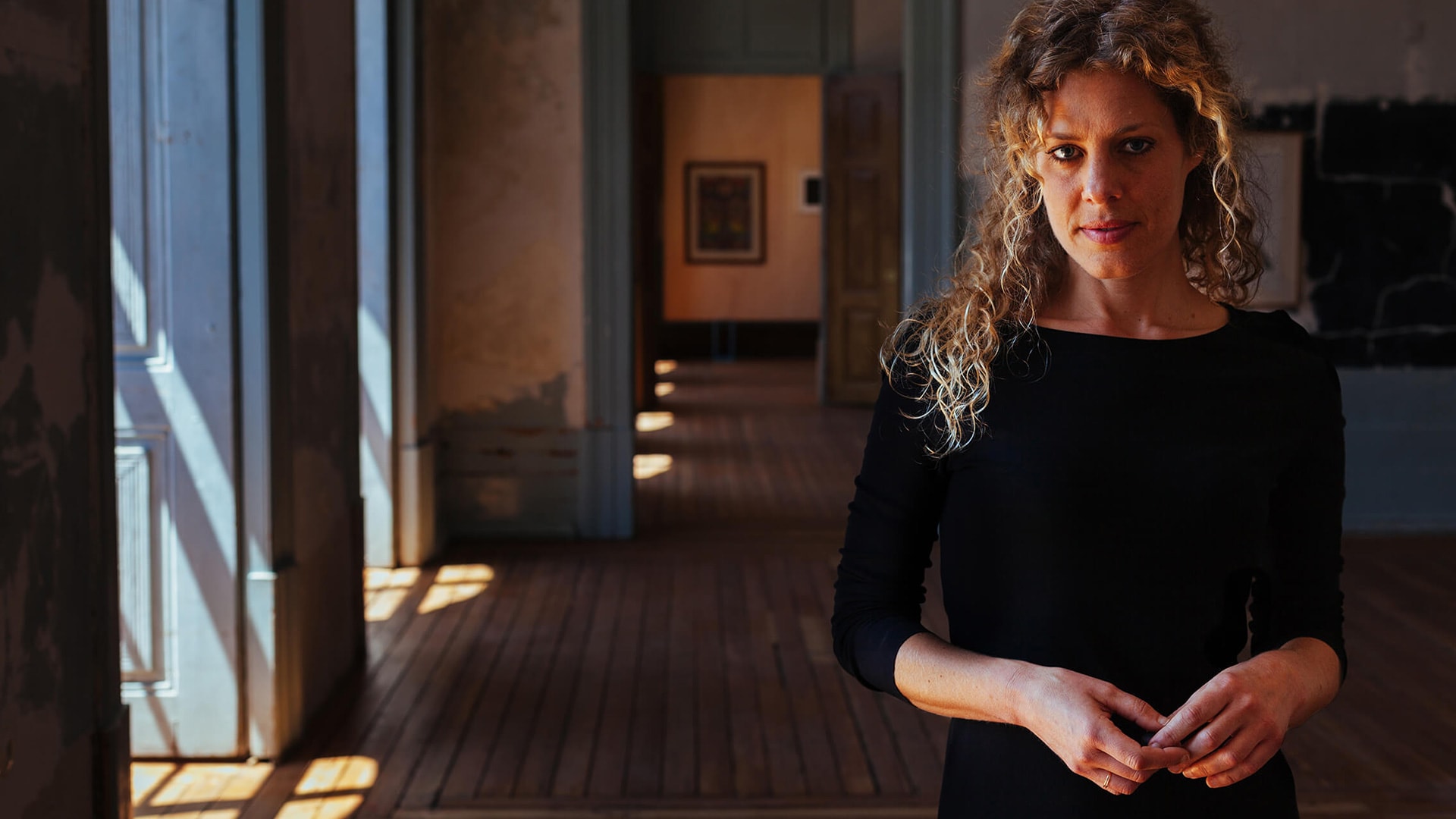
The art of wasting time
Interviewed on 7 May 2019 over lunch at the Taberna Sal Grosso in Lisbon.
Fun fact: What do Malcolm X, Steven Seagal and Joanna Hecker have in common? They are all children of Lansing, capital of the state of Michigan, in the United States of America. The city is known for its automotive factories, and recognized for its university. From the union of these two worlds, blue collar family and white collar family, came the three Hecker sisters with Joanna in the middle. Because her parents worked in university administration, our interviewee practically grew up on campus, involved in studies in all areas. About 8 years ago she fell in love with a 16th-century Portuguese and moved from the hustle and bustle of New York to the quiet life of Lisbon.
Meanwhile, after completing a doctoral thesis in art history on Francisco de Holanda (the aforementioned Portuguese), she has been working on multiple fronts: co-organising (and offering inspiring introductions to) the bands that play at the Lisbon Living Room Sessions, being responsible for the area of international partnerships at the Lisbon Architecture Triennale, translations and various writing projects (including a book in progress) – that is, a series of activities that are a complete violation of her principles. What Joanna wants most is a quiet life, unplugged, boring and full of nothing – to fill with her family, her friends, her ideas, and her dog Milo.
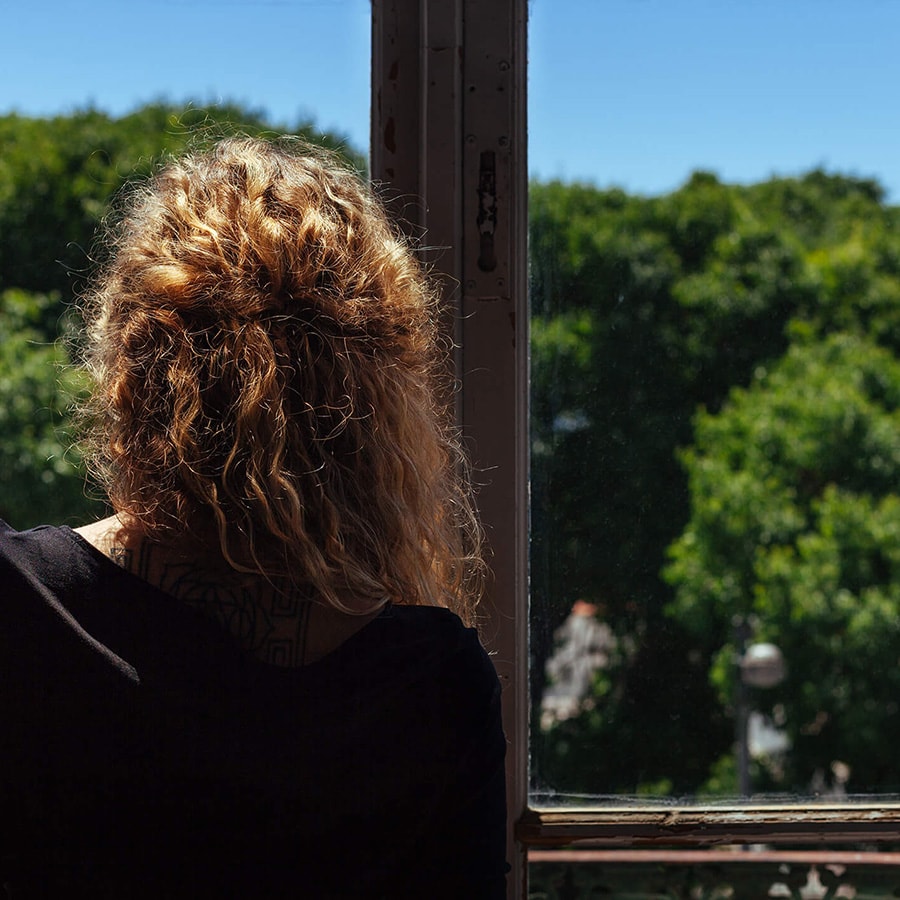
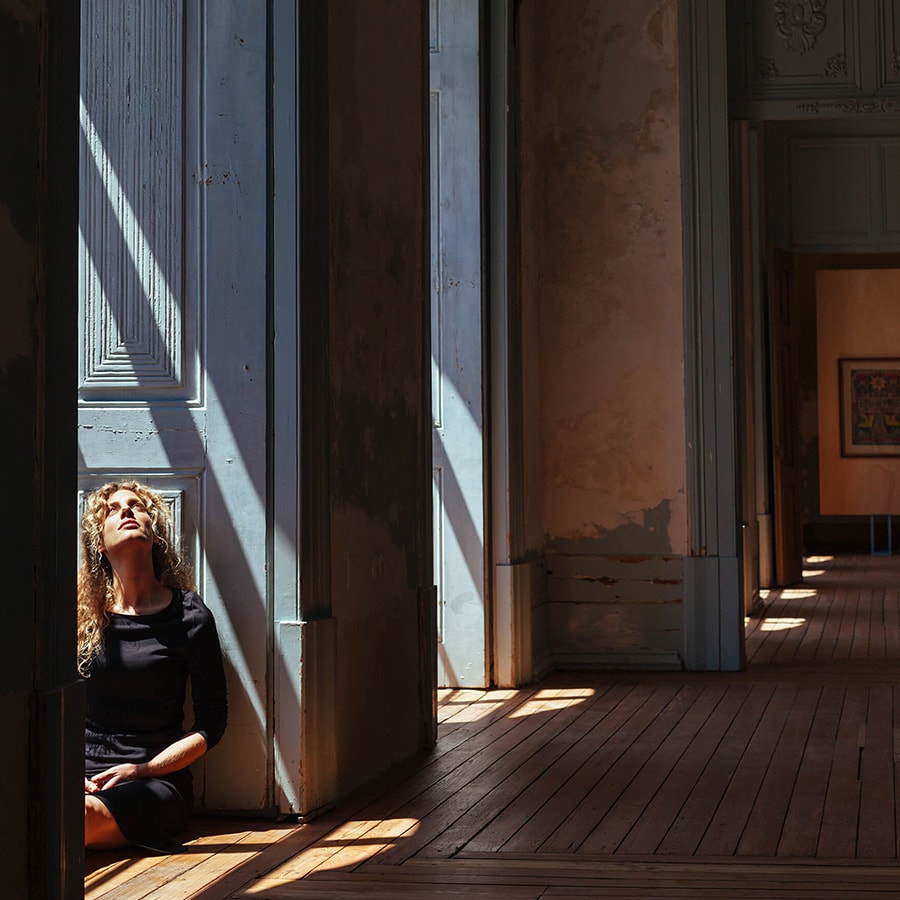
"A friendship can fall into the category of family if we invest enough time."
"As I get older I feel that it is increasingly important to slow down and stop."
"I don’t absorb things: I get completely absorbed by them."
"Emptiness is fullness in another way: it is a space that can be filled with anything we want! To be empty is to be full of space."
"Time is not money. That is so wrong. Time is love. Time is life. Time is everything. Without time, we are nothing."
"In theory, when we run out of money, there are many ways to make more. When the time we have runs out, it’s over - we can’t make more."
"More and more, I’m trying to do less and less and less."
"The goal is to be able to slow down, stop, find silence and then see what happens. This is a kind of philosophical guideline for me."
"The value of all of those hours is immeasurable in a way that I can’t explain."
Is it possible to identify traits that Joanna inherited from both sides of the family? “On my mother’s side they are more affectionate, and express their feelings with ease. They are noisy, very loud, humble, and with lots of curly hair. Their origin is Serbian. On my father’s side they are smart – sometimes too smart: they tend to be critical, and easily disappointed. They always want more. They are wealthier, more educated, socially ambitious. They come from Germany and Ireland – which means they’re drinking buddies.”
The result of these two worlds seems very balanced, despite the curly hair that cannot be tamed. “I don’t know. Will I end up balanced, or bipolar? (laughs) Just to clarify, I don’t suffer from this disorder: I’ve already checked.”
